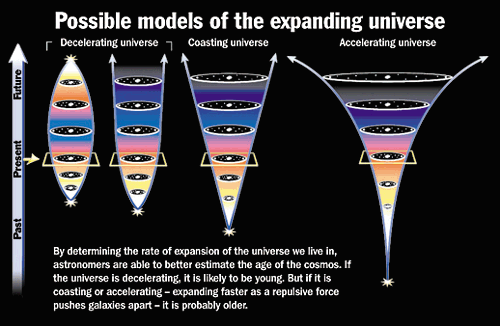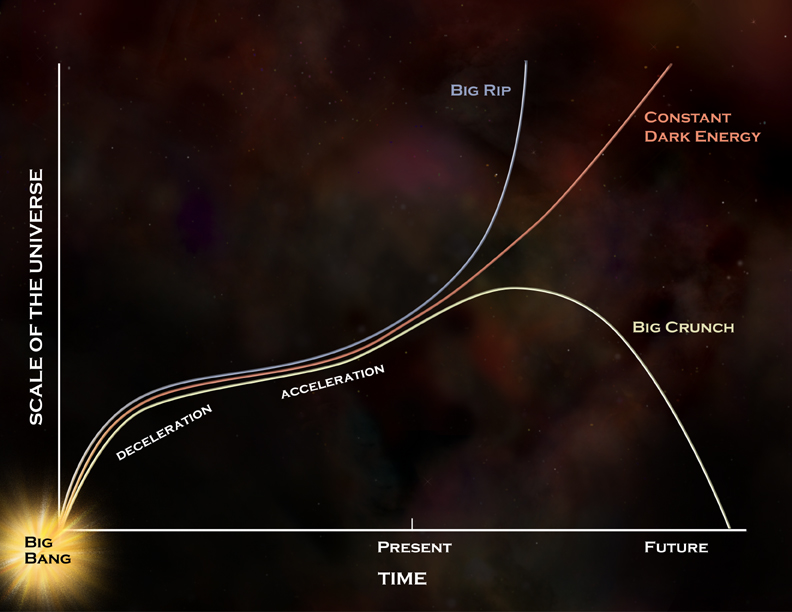This conspiracy-like symmetry is paradoxical: in the Newtonian and special relativistic descriptions, the underlying space stays the same, uninvolved stage, while in the generally relativistic picture, space expands in the concrete sense that there is more of it than before (true even in infinite universes!). This is the “expansion-paradox” [1]:
Space expands globally although it nowhere expands.
The orthodox relativistic view likes to resolve this with help of space-time not being space in time: The four dimensional whole is one unchanging consistent arrangement, the “block universe”. The smaller space in the past is simply a different region of the whole. It did not grow into the larger space of today; it is still in the past.

This seems to be a beautiful argument. The whole growth-of-space problematic seems to vanish. This is partially why the concept of abstract metric expansion is thought superior to the concept of expansion of space, which has been argued to be devilishly problematic [2][3].
Such arguments aim to support an abstract view and orthodox relativity, refusing space substance like ethers. But such arguments fail especially where they favor expansion through space. Ironically, in arguing against ether theories, one perhaps should talk about expansion of space, because the growth of a hypothetical space-substance is their biggest difficulty; it violates the conservation of substance (continuity equation).
For substance-models, the expansion-paradox is a strict contradiction: Substance cannot by some magic globally appear without being locally supplied somewhere (or everywhere, but still with a locally acting mechanism). Substance must flow in from the sides or locally expand or units must multiply, perhaps “rain down” from a higher dimension. Particularly considering fast cosmic inflation, many ether theories cannot come up with a mechanism that supplies space that rapidly.

There is also the question about the costs of new material. Does not only mere emptiness come for free? Reconfirmed with the discovery of the Higgs ether recently, we know that space is not just emptiness. In fact, there has always been the big inconsistency of the orthodox view with particle physics.

The modern standard model of physics is a Einstein local (Information cannot travel faster than light) micro physics (particle physics / local field theory), and if space does only globally know that it expands, it is inconsistent with a local micro physics point of view: That nothing locally expands anywhere is incompatible with there being overall more space – that is the expansion paradox, which is valid if space is not just mere emptiness, which space is not. On the other hand, given Einstein locality, if space expands everywhere, how does the local environment know about how much space it is supposed to produce in order to get the correct overall production of space that depends on the changing global average matter density? Local space cannot know the global density. How would it - not even the local curvature is close to the global average, which is moreover flat anyway!
What is the solution to this paradox? It is actually straight forward: Just like the ever repeated “Einstein disproved the Ether!” or the false “Faster than light travels in time and kills your granny!” misconceptions, also the mantra of that “Space does not locally expand!” is simply wrong, nothing more than a misleading dogma brought on by an almost religious interpretation of general relativity as some sort of magical geometry rather than a mathematical description of physics that holds in a certain domain of applicability, as scientific theories always do. Space does locally expand! Yes it does, and this is not even my own discovery. (I wish it were, but others were faster – I can only claim to have provided a description of the local versus global consistency.[4])

The expansion scalar of general relativity’s Raychaudhuri equation is formally a rate of local space reproduction [5]. This “local Hubble constant” does indeed, if averaged over the whole of the universe, which is highly nontrivial in curved space-time, add up to the overall observed expansion of the universe. Local physics does not need to magically know the global average density.
The funny thing is: It is therefore consistent with orthodox general relativity that a space-substance procreates locally with a base rate (relative to cosmological time) that is time dilated according to the extrinsic curvature that the Raychaudhuri scalar depends on [4]. In lay terms: Even fast exponential inflation can be modeled with a slow dividing of fundamental units, namely only once every 108 Planck times. This is totally ridiculous from an orthodox point of view – yet also the same! Duality strikes again.
The local expansion is very slow and it only adds up to a large global value because there is so much space in the observable universe. This ensures that we do not feel it locally in our living rooms or when watching the moon. That and the fact that we cannot feel un-accelerated expansion anyway inside systems that are bound by gravity, which is a very subtle point difficult to explain. And there is a third reason for that we do not locally see expansion: Around here, the local expansion is actually much much slower than in the mostly empty, vast stretches of vacuum out in the universe. Space expands the faster the emptier it is. This is ironically due to it wanting to pull itself together, making space the "Ultimate Sisyphus". Anyway, even the vacuum in galactic space (our living room) is rather full of particles compared to the large empty voids of the universe.
---------------------------------
[1] Vongehr, S.: Supporting Abstract Relational Space-Time as fundamental without Doctrinism against Emergence. arXiv:0912.3069v2 (2009)
[2] Peacock, J. A.: A diatribe on expanding space. arXiv:0809.4573 (2008)
[3] Francis, M. J., et al.: Expanding Space: the Root of all Evil? Pupl. Astron. Soc. Austral. 24,95-102 (2007)
[4] Vongehr, S: Metric Expansion from Microscopic Dynamics in an Inhomogeneous Universe. Communications in Theoretical Physics 54(3), 477-483 (2010), arxiv.org/abs/1008.2810
[5] Buchert, T: On Average Properties of Inhomogeneous Fluids in General Relativity: Perfect Fluid Cosmologies. Gen. Rel. and Grav. 33(8), 1381-1405 (2001)
--------------------------------------------





Comments